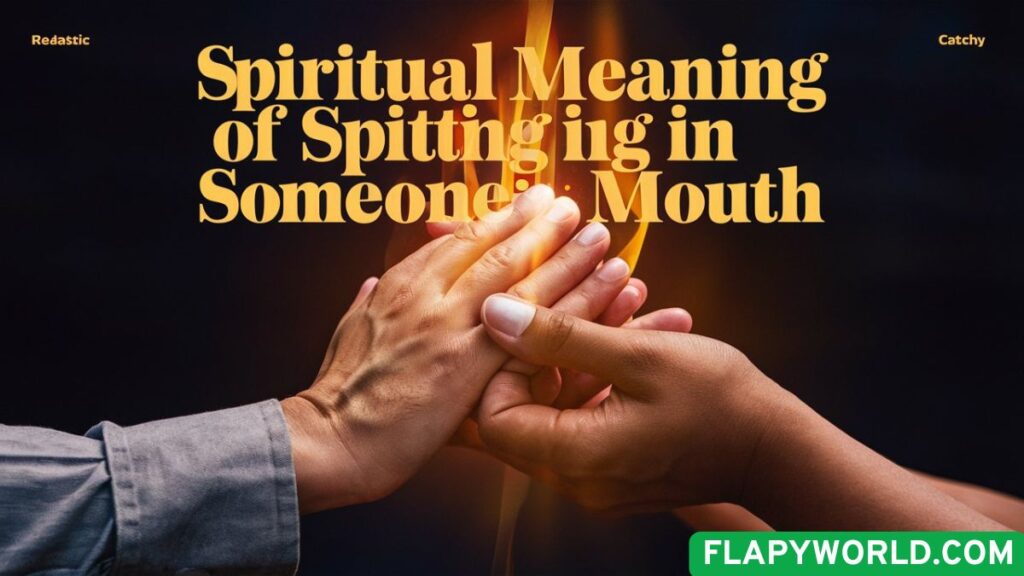The Spiritual Meaning of Spitting in Someone’s Mouth refers to a symbolic act where saliva is shared between two people to show trust, connection, or spiritual energy. It is not just a physical act. It carries deep meanings in different cultures. People believe it can represent bonding, protection, or healing. This practice has existed in ancient rituals and traditions.
Have you ever wondered why some cultures consider this unusual act sacred? It may seem strange or shocking at first. Yet, many spiritual traditions see it as a way to connect deeply with another person. This act is full of symbolism. It goes beyond the body. It touches the spirit and energy between people.
The Spiritual Meaning of Spitting in Someone’s Mouth can show trust, unity, and transformation. It is sometimes part of rituals or blessings. In dreams or ceremonies, it symbolizes sharing life force or energy. Different cultures interpret it differently. The act is meant to strengthen spiritual bonds and bring protection or empowerment
Ten Spiritual Meanings of Spitting in Someone’s Mouth
Trust
At the core of the spiritual meaning of spitting in someone’s mouth lies trust. Sharing saliva requires extreme vulnerability from both the giver and receiver. In trust and vulnerability symbolism, the receiver accepts the giver’s essence, believing it carries no harm, while the giver surrenders personal boundaries to the act. This act goes beyond simple physical interaction; it becomes a profound declaration of faith and openness. Historically, in ancient saliva rituals, such exchanges were a public testament to mutual respect and confidence. In modern spiritual contexts, this practice symbolizes letting go of fear and fully embracing connection with another person.
Bonding
Spiritual bonding through saliva has been a cornerstone of many cultural rituals. Exchanging saliva is believed to mix life forces and energies, creating a unity that extends beyond physical intimacy. In tribal ceremonies, such exchanges solidify social ties, familial bonds, and even alliances between clans. The bonding and unity rituals suggest that two individuals or groups can merge their spiritual essence, fostering a deep sense of shared purpose. Whether in initiation rites or sacred agreements, the act conveys a message of togetherness and commitment that words alone cannot express.
Strength
In several traditions, the act of spitting in someone’s mouth is linked to the transfer of strength. Elders or spiritual leaders may impart their courage, resilience, or spiritual fortitude to younger members through strength and empowerment traditions. The saliva is seen as a carrier of energy, allowing the recipient to absorb part of the giver’s power. In some indigenous tribes, this practice was considered vital for preparing warriors or spiritual apprentices. Across cultures, this act embodies both physical and spiritual empowerment, bridging the gap between generational wisdom and personal growth.
Healing
Historically, saliva has been used in saliva in healing rituals across civilizations. From Roman times to indigenous tribes, healing with saliva symbolism often involved using saliva as a conduit for health restoration. Beyond its physical properties—saliva contains enzymes and antibodies—spiritual practitioners believed it could cleanse, balance, and restore the spirit. Shamans in the Amazon, for example, mix indigenous saliva rituals with medicinal herbs, viewing the combination as a powerful healing tool. These rituals illustrate the broader belief in saliva as a medium of energy transfer, capable of influencing both the body and soul.
Protection
Saliva as spiritual protection appears in many cultural interpretations of saliva rituals. Spiritual leaders would sometimes use saliva to ward off evil spirits, negative energies, or curses. This symbolism transforms the physical act into a spiritual shield, creating a barrier of safety around the recipient. In saliva blessing meaning, the act is not meant to intimidate but to safeguard and provide divine or ancestral protection. Across ancient saliva rituals and modern spiritual interpretations, protection remains one of the key purposes behind this unusual but meaningful practice.
Unity

Unity emerges naturally through spitting in mouth symbolism. By sharing saliva, individuals symbolically merge their lives, energies, and destinies. Bonding and unity rituals in certain tribes or cultures often use saliva exchanges during peace-making ceremonies, where enemies reconcile or families form strong alliances. The act conveys a message that differences are dissolved and that participants are connected at a spiritual level, fostering harmony and collective identity.
Read Also: Rat Spiritual Meaning and Symbolism
Commitment
The exchange of saliva can also represent a profound commitment through rituals. Just as vows, handshakes, or sacred covenants seal promises, saliva in sacred ceremonies confirms dedication between participants. This practice could appear in marriage rituals, tribal pledges, or apprenticeship traditions. The message is clear: the participants are willing to share the most intimate essence of themselves, demonstrating loyalty, devotion, and trust in a tangible and symbolic way.
Empowerment
Receiving saliva from a respected figure often symbolizes strength and empowerment traditions. The recipient may gain spiritual energy, wisdom, or latent abilities, depending on the context. In shamanic practices, saliva as a medium of energy transfer can awaken latent skills or enhance intuition. This empowerment is not only symbolic; it carries deep psychological meaning, reflecting growth, resilience, and spiritual readiness for new responsibilities or paths.
Transformation
Spiritual transformation saliva is central to initiation rites and other sacred practices. Exchanging saliva can signify rebirth, cleansing, or metamorphosis. Through spiritual transformation practices, the recipient is believed to transition from one stage of life to another, adopting new spiritual awareness or entering a deeper phase of personal development. This transformative aspect aligns with other symbolic rituals where the act serves as a bridge between old and new identities, illuminating the potential for profound inner change.
Divine Connection
Finally, the act can represent divine connection symbolism. In some religious practices, saliva is seen as a channel for blessings, cosmic energy, or divine grace. The act becomes not just a human exchange but a spiritual one, where participants tap into higher powers or receive sacred guidance. In Sufi traditions or saliva in Sufi practices, for instance, the saliva may carry the essence of a spiritual leader’s blessing, connecting the mundane with the divine in a direct and symbolic way.
Cultural and Religious Perspectives
The spiritual meaning of spitting in someone’s mouth varies widely across cultures and religions. In many societies, saliva is seen as a life force or essence, making saliva in sacred ceremonies a symbol of trust, empowerment, and spiritual connection. Spitting in mouth cultural traditions appear in tribal rituals, indigenous healing practices, and even some spiritual folk practices, reflecting centuries of belief in saliva as a medium of energy transfer. These acts often emphasize unity, protection, and blessing, showing how deeply humans link physical acts with spiritual symbolism.
Spiritual Meaning in Islam
In Islamic history, saliva ritual in Islam is found mainly in Sufi and folk practices. Spiritual leaders sometimes used saliva for healing or blessings, reflecting ancestral blessings through saliva. However, the act is not widely endorsed in mainstream Islamic practices. These variations highlight the importance of understanding the ethical and health considerations of rituals before attempting them.
Biblical References and Christian Interpretations
The biblical meaning of saliva appears in several New Testament accounts. For example, Jesus used saliva to heal the blind or sick in Mark 8:22-26, demonstrating saliva ritual in Christianity as a medium of divine healing. While spitting directly into someone’s mouth is not described, the symbolic value emphasizes faith, divine power, and spiritual energy transfer.
Indigenous and Tribal Practices
Across Africa, the Amazon, and other indigenous societies, indigenous saliva rituals are common in rites of passage, healing ceremonies, or spiritual bonding activities. These acts often reflect saliva as life force or essence, blending the physical and spiritual realms. Shamans or tribal elders use saliva to transmit energy, protect participants, or mark transformative moments in an individual’s life.
Dream Symbolism
Dreams about spitting in mouth carry deep spiritual meaning. Dreamers may interpret these experiences as receiving knowledge, blessings, or spiritual energy. According to dream interpretation experts, dream meaning spitting in mouth can indicate the need for shadow work and vulnerability, integration of personal traits, or a desire for deeper connection.
| Dream Scenario | Possible Interpretation |
| Receiving spit | Gaining knowledge, blessings, or spiritual energy |
| Giving spit | Sharing wisdom or influence with others |
| Involuntary spitting | Feeling a loss of control or unwanted responsibility |
| Swallowing spit | Accepting external influence or spiritual guidance |
Psychological Perspective
From a psychological viewpoint, psychological perspective of saliva exchange connects with intimacy, trust, and self-integration. Freudian theory may link it to oral fixation, while Jungian psychology interprets it as a merging of energies or identity aspects. Modern psychology also views the practice as a manifestation of connection, personal boundaries, or energy dynamics in relationships. The act can mirror deep desires for trust, nurturing, and empowerment, highlighting the interplay of spiritual transformation practices and the human psyche.
Ethical and Health Considerations
Modern understanding emphasizes ethical and health considerations of rituals involving saliva. Saliva can carry bacteria, viruses, or other pathogens, making physical practices risky. Consent, mutual understanding, and hygiene are essential. Many spiritual benefits of saliva in sacred ceremonies can be achieved symbolically or through energy work, meditation, or prayer without physical contact. Respecting boundaries ensures safety while maintaining the spiritual intent behind ancient saliva rituals.
Contemporary Relevance
Today, few people practice spitting in mouth cultural traditions literally, yet its symbolism persists. Modern spiritual movements often reinterpret the act as energy transfer, mentorship, or symbolic blessing. Terms like “spitting knowledge” capture this essence, emphasizing direct influence or teaching. By understanding saliva as a medium of energy transfer, contemporary seekers can appreciate the underlying values of trust, empowerment, and divine connection without engaging in potentially unsafe physical rituals.
Is Spitting in Someone’s Mouth Witchcraft?
The act of spitting in someone’s mouth is not inherently witchcraft. In many spitting in mouth cultural traditions, it serves as a spiritual blessing or energy transfer. Elders, shamans, or spiritual leaders may perform the act to empower, protect, or heal, aligning it with sacred rituals rather than dark magic. Intent is the key factor in defining its spiritual meaning.
However, if someone uses this act to manipulate, control, or harm another, it can be interpreted as witchcraft or occult practices. Historical records and modern spiritual teachings emphasize that ritual intent determines the moral and spiritual nature of the act. Understanding context and cultural background is essential before labeling it harmful or magical.
Is Spitting in Someone’s Mouth Dangerous?
Physically, spitting in someone’s mouth can be risky. Saliva contains bacteria, viruses, and other pathogens that can transmit illnesses. Even though saliva in healing rituals carries symbolic and spiritual significance, modern medicine warns that direct contact can spread infections such as herpes, flu, or oral diseases. Careful consideration and hygiene are critical to avoid harm.
Spiritually, the act may offer trust, bonding, or empowerment, but the literal practice is not always safe. Many spiritual communities suggest symbolic alternatives like visualized energy transfer or ritualized gestures. These preserve the spiritual transformation saliva represents while eliminating the physical risks, keeping the intent of blessing, healing, and protection intact.
Spitting in Someone’s Mouth Soul Tie Spiritual Meaning Love
In spiritual contexts, spitting in someone’s mouth can symbolize a profound soul tie in love. Sharing saliva is seen as exchanging life force or essence, creating a deep bond between partners. This intimate act embodies vulnerability, trust, and unity, forming connections that extend beyond physical attraction into spiritual and emotional alignment.
Such a soul tie can signify commitment, loyalty, and shared energy. When performed with consent and mutual intention, it reflects bonding and unity rituals, amplifying love and spiritual closeness. Some traditions believe this exchange enhances emotional intimacy, strengthens trust, and aligns the energies of two people on a higher spiritual level.
Someone Spitting in Your Mouth in a Dream

Dreams of someone spitting in your mouth often carry symbolic meaning. Psychologists and dream interpreters link this to receiving knowledge, spiritual guidance, or emotional energy from another person. The act in dreams represents dream meaning spitting in mouth, where the unconscious mind reflects a desire for trust, intimacy, or acceptance of influence.
Alternatively, dreaming of spitting may reveal personal boundaries or control issues. It can signify integration of new qualities, confronting hidden emotions, or shadow work and vulnerability. The dream encourages reflection on relationships, energy exchange, and personal growth, showing how symbolic saliva in dreams mirrors real-life spiritual and emotional experiences.
Read Also: Egret Symbolism & Meaning: A Complete Guide to Spiritual Wisdom
Someone Spitting in Your Mouth in the Bible
The biblical meaning of saliva appears in the New Testament, where Jesus uses saliva in healing miracles, such as restoring sight to a blind man. These acts emphasize divine power and spiritual transmission rather than literal mouth-to-mouth contact. The use of saliva represents saliva ritual in Christianity as a conduit for blessings and healing.
Symbolically, spitting in someone’s mouth in biblical terms reflects faith, trust, and divine connection. It signifies receiving spiritual essence or divine favor. While the literal act is rare in scripture, its presence underscores how saliva has historically been perceived as sacred, capable of transmitting grace, energy, or life force for spiritual purposes.
From a Psychological Perspective
Psychologically, spitting in someone’s mouth can reflect trust, intimacy, and personal boundaries. Freudian theory may connect it to oral fixation, while Jungian perspectives view it as a merging of energies or aspects of the self. The act can symbolize the integration of hidden traits or identity exploration through shared vulnerability and psychological perspective of saliva exchange.
Modern psychology interprets the act as representing connection, power dynamics, or dependency. It can highlight desires for nurturing, trust, and emotional closeness. Engaging in or reflecting on this act—symbolically or in dreams—can reveal how humans process intimacy, empowerment, and spiritual transformation practices, showing the deep interplay between mind, body, and spirit.
FAQ’s
What can happen if someone spits in your mouth?
Physically, it can transmit bacteria or viruses, posing health risks. Spiritually, it may symbolize trust, energy exchange, or intimacy depending on context.
What is the spiritual significance of saliva?
Saliva often represents life force, spiritual energy, healing, protection, and the transfer of blessings or essence.
What does spitting on someone signify?
It usually symbolizes disrespect, anger, or rejection, but in some rituals, it can also mean cleansing or protection.
What does spit symbolize?
Spit can symbolize power, energy transfer, life force, purification, or even contempt depending on cultural or spiritual context.
What is the psychology behind spitting?
Psychologically, it can reflect aggression, boundary setting, oral fixation, trust, intimacy, or energy exchange between individuals.
Conclusion
The spiritual meaning of spitting in someone’s mouth is multifaceted, blending trust, bonding, strength, healing, protection, unity, commitment, empowerment, transformation, and divine connection. Across cultures, religions, and historical practices, saliva has served as a conduit for spiritual energy, life essence, and sacred blessings. From saliva in healing rituals to initiation rites and saliva symbolism, the act emphasizes vulnerability, trust, and connection, reflecting humanity’s timeless quest for spiritual intimacy and growth.
While the literal practice may be uncommon today, understanding its symbolic and cultural significance offers insights into spiritual bonding through saliva and the broader human desire to connect with each other and the divine. By appreciating the rich traditions, ethical considerations, and psychological implications, we can embrace the wisdom of these ancient rituals in safe, meaningful, and spiritually fulfilling ways.

James Morris is an experienced blogger and content creator at FlapyWorld.com. With a passion for writing and sharing insightful content, James specializes in crafting engaging posts on a variety of topics, including wishes, messages, and inspirational content. His goal is to inspire, inform, and connect with readers through thoughtful and well-researched articles.







